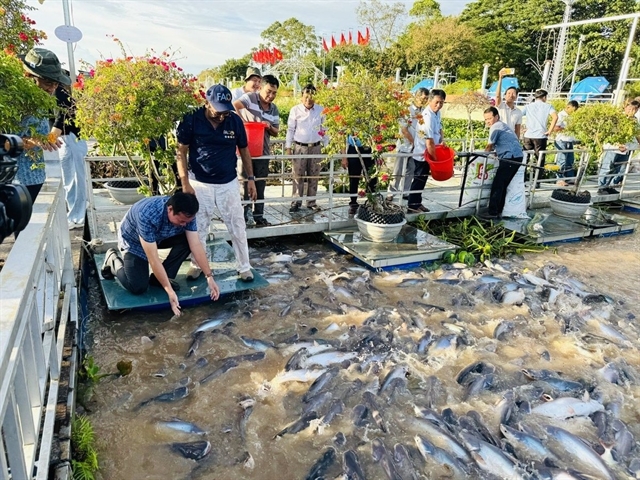 Society
Society


|
| A community model of management and regeneration of aquatic resources in Đồng Tháp Province. Photo nongnghiepmoitruong.vn |
ĐỒNG THÁP – Agroecology is not only a method of farming but also a way of listening to and respecting nature, said Lê Minh Hoan, Vice Chairman of the National Assembly.
“It represents Việt Nam’s long-term vision to meet global commitments on climate change, to move towards net-zero emissions by 2050, and to ‘sow the future’ for generations to come,” Hoan told the workshop Promoting Agroecology and Food System Transformation to Address Climate Change, Enhance Biodiversity and Improve Livelihoods, held on Monday. The event was co-organised by the Ministry of Agriculture and Environment (MAE) and the Đồng Tháp Provincial People’s Committee, with support from the World Wide Fund for Nature (WWF) and the Food and Agriculture Organization of the United Nations (FAO).
Meanwhile, Nguyễn Thành Diệu, Vice Chairman of the Đồng Tháp People’s Committee, stressed that agroecology is an inevitable path towards sustainable agriculture, one that harmonises economic growth with environmental protection.
Đồng Tháp Province is currently pioneering a shift to ecological farming, with the goals of achieving net-zero emissions, conserving biodiversity, and improving sustainable livelihoods. The province is moving decisively from “agricultural production” to an “agricultural economy”, placing farmers at the centre, with co-operatives and enterprises as key pillars, and science and technology as the driving force. It is promoting circular production models, efficient use of land and water resources, and reductions in greenhouse gas emissions.
At the same time, the application of digital technologies in irrigation management, zoning, product traceability, and market connectivity is seen as essential for enhancing the value of agricultural products.
According to a 2023 forecast by the Intergovernmental Panel on Climate Change (IPCC), around 40 per cent of the Mekong Delta – the nation’s rice bowl – could be inundated by a one-metre rise in sea levels, threatening the livelihoods of more than 17 million people.
The complex challenges facing food systems – climate change, biodiversity loss and food insecurity – can only be addressed through multi-stakeholder collaboration.
Agroecology provides a powerful approach, offering a holistic framework that combines indigenous knowledge with modern science and ecological principles to build more resilient, sustainable and equitable food systems.
This conference marked a concrete step in advancing Việt Nam’s international commitments – from the net-zero target pledged at COP26 to the Statement on Sustainable Agriculture at COP28 – underscoring the country’s determination to achieve a transparent, responsible and sustainable transformation of its food system.
A key highlight of the event was the multi-stakeholder dialogue, which brought together representatives from the Government, international organisations, co-operatives, farmers, businesses and associations.
By drawing on diverse and in-depth perspectives from all parties, the platform proved crucial in aligning vision with action and in translating theoretical commitments into practical implementation. The panel discussion is expected to contribute to the accelerated development of transparent, interconnected value chains, ensuring farmers remain at the centre of the transformation process.
Such efforts are instrumental in helping Việt Nam’s agriculture achieve sustainable development, adapt effectively to climate change and strengthen its value in the global market.
During the event, Vinod Ahuja, FAO Representative in Việt Nam, emphasised: “This event marks a significant milestone in our collective journey to build sustainable and resilient food systems in Việt Nam. The multi-stakeholder discussion, in particular, is a clear testament to our commitment to turning policy into tangible action.”
“By fostering stronger public–private partnerships and mobilising resources, we can build on the country’s progress and ensure its agricultural sector is equipped to address the impacts of climate change and secure a better future for its people,” he added.
The event served as a vital bridge between policy and practice, and between national capacity and international support. By simultaneously advancing technical solutions, market mechanisms and green finance, the conference is expected to deliver a clear action plan, a portfolio of priority projects and strengthened multilateral partnerships, helping to position Việt Nam as a regional leader in agroecology and sustainable food system transformation. VNS
Loading rewrite